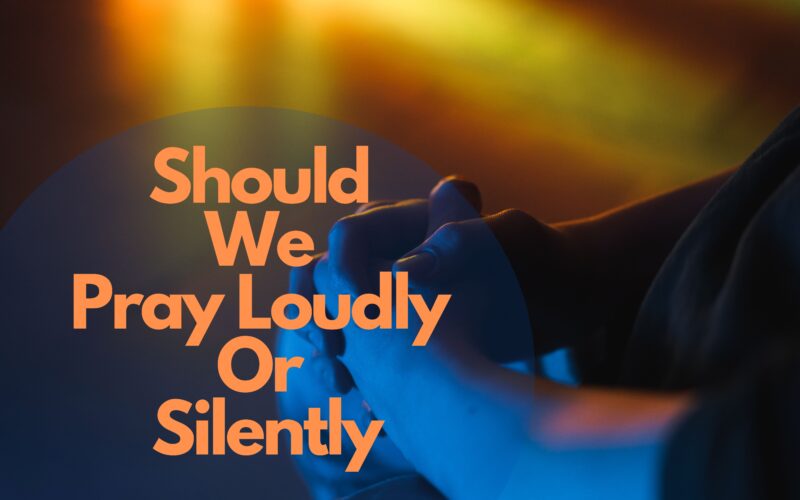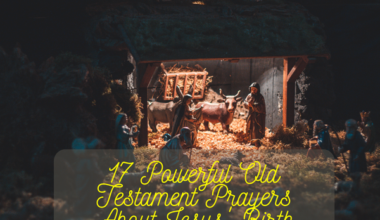Table of Contents Show
Prayer, a universal act of communication with the divine, holds profound significance in the lives of believers across various religions and cultures. The style of prayer, whether loud or silent, has been a subject of contemplation and debate among practitioners for centuries.
Prayer often considered a spiritual bridge between humanity and the divine, manifests in diverse forms across different faith traditions. While some individuals find solace in the serenity of silent prayer, others seek spiritual fulfillment through the resonance of loud supplications echoing through sacred spaces. Understanding the essence of prayer is paramount to exploring the dichotomy between praying aloud and in hushed tones.
Should We Pray Loudly Or Silently
In this comprehensive article, we solve the age-old question: Should We Pray Loudly Or Silently? Exploring the merits, spiritual significance, and personal experiences associated with both prayer styles, we navigate the diverse landscape of worship practices.
Different Styles of Prayer
Silent Prayer: Embracing Inner Stillness
Silent prayer, characterized by its quiet introspection, allows individuals to delve deep within their souls, fostering a profound sense of inner peace and mindfulness. The absence of external distractions enables a focused connection with the divine, creating a sacred silence where believers can pour out their hearts in solitude.
Loud Prayer: Voices Raised in Devotion
Conversely, loud prayer resonates with the fervor of communal worship. The harmonious chants and heartfelt pleas reverberate within the walls of temples, mosques, churches, and synagogues, creating an atmosphere charged with collective devotion. The act of praying aloud not only strengthens the bonds of the community but also serves as an emotional outlet, allowing worshippers to express their deepest feelings openly.
Benefits of Silent Prayer
Inner Peace and Mindfulness
Silent prayer provides a sanctuary of tranquility where individuals can quieten the cacophony of daily life, finding solace in the stillness of their minds. This practice fosters mindfulness, allowing practitioners to be fully present in the moment and attuned to their inner selves, creating a profound spiritual experience.
Personal Connection with the Divine
In the silence of solitary prayer, believers often report feeling a direct, personal connection with the divine. The absence of external influences allows for a more intimate and heartfelt communion, where individuals can express their innermost thoughts, fears, and gratitude without reservation.
Reduced Distractions and Focus
Silent prayer minimizes external distractions, enabling practitioners to maintain a singular focus on their spiritual connection. This heightened concentration enhances the depth of the prayer experience, allowing for a more profound sense of divine presence and guidance.
Benefits of Loud Prayer
Community and Communal Worship
Loud prayer, on the other hand, fosters a sense of community and collective devotion. Worshipping together creates a powerful sense of unity among believers, reinforcing their faith and shared spiritual journey. The collective energy generated during loud prayer often amplifies the sense of divine presence, creating a spiritually charged environment.
Expressiveness and Emotional Release
Praying aloud provides an outlet for the expression of deeply rooted emotions. Believers can openly vocalize their joys, sorrows, and supplications, experiencing catharsis and emotional release. The act of vocalizing one’s prayers can be profoundly therapeutic, offering a sense of relief and comfort.
Strengthening Faith and Belief
The vocal affirmation of faith through loud prayer can strengthen believers’ convictions. Hearing the collective voices of fellow worshippers reinforces religious beliefs, creating a powerful sense of solidarity within the community. This shared affirmation of faith can deepen one’s spiritual journey and commitment to their religious beliefs.
Cultural and Religious Variations
Prayer styles vary significantly across different cultures and religious traditions. In Christianity, both silent contemplation and communal prayer services are valued. In Islam, congregational prayers are loud and harmonious, emphasizing the unity of the ummah (community). Hinduism embraces a wide array of prayer practices, including both silent meditation and boisterous celebrations during festivals. Buddhism emphasizes silent meditation as a means of achieving enlightenment, while also incorporating chanting and communal prayers.
Scientific Perspectives on Prayer
Beyond the realm of faith, scientific studies have delved into the impact of prayer on mental and physical health. Research suggests that prayer, whether silent or loud, can have positive effects on individuals’ well-being. Silent prayer has been associated with reduced stress levels, improved emotional regulation, and enhanced overall mental health. Similarly, loud prayer in a community setting has been linked to increased social connectedness, reduced feelings of isolation, and improved emotional resilience.
Debates and Controversies
The debate between praying loudly or silently is not confined to individual preferences; it extends to theological discussions and interpretations within religious communities. While some argue for the purity of silent communion with the divine, others advocate for the communal strength derived from loud, collective worship. Modern perspectives reflect the evolving nature of religious practices, with some communities embracing a blend of both styles to cater to diverse individual needs.
Personal Preference and Individual Experience
At the heart of the debate lies personal preference and individual experience. Some individuals find solace and connection in the solitude of silent prayer, relishing the intimacy of their conversations with the divine. Others find spiritual fulfillment in the company of fellow believers, embracing the collective energy of loud communal worship. Factors such as personality, upbringing, and religious upbringing play a significant role in shaping one’s preference for a particular prayer style.
Guidance from Religious Texts
Religious scriptures provide varying perspectives on prayer styles. For instance, the Bible mentions instances of both silent reflection and vocal prayers, emphasizing the sincerity and intentionality of the worshipper. Islamic teachings highlight the importance of unity and harmonious recitation during congregational prayers, promoting a collective expression of faith. Hindu scriptures extol the virtues of both individual meditation (dhyana) and communal chanting (sankirtan), emphasizing the multifaceted nature of spiritual practice.
Finding a Balance
In the quest for spiritual fulfillment, some believers opt for a balanced approach, integrating both silent and loud prayer into their routines. This harmonious blend allows for personal introspection and intimate connection with the divine through silent prayer, while also fostering a sense of community and shared devotion through communal worship. Finding this equilibrium often leads to a more holistic and fulfilling spiritual journey.
Impact on Spiritual Growth
Ultimately, the choice between silent and loud prayer significantly influences an individual’s spiritual growth. For some, the quietude of silent prayer provides a sacred space for self-discovery and deepening faith. For others, the communal energy of loud prayer nurtures a sense of belonging and strengthens religious conviction. Regardless of the chosen style, the sincerity of intention and the depth of devotion play pivotal roles in spiritual development.
Conclusion
In the realm of prayer, the debate between praying loudly or silently is nuanced and multifaceted. Each style carries its own unique merits, offering believers diverse paths to spiritual fulfillment. As we navigate this age-old question, it is essential to recognize that the choice between silent and loud prayer is deeply personal and rooted in individual convictions. Embracing diversity within religious practices and respecting the preferences of fellow believers fosters an atmosphere of understanding and unity within religious communities.
In the tapestry of faith, the threads of silent and loud prayer interweave, creating a rich and vibrant mosaic of spiritual expression. As believers embark on their respective journeys, it is the sincerity of their hearts and the depth of their devotion that truly matter. May these diverse prayer styles continue to inspire, comfort, and uplift the souls of those who seek connection with the divine.
FAQs
FAQ 1: Is one style of prayer more effective than the other?
The effectiveness of prayer is subjective and deeply personal. Both silent and loud prayer styles have their merits, and what matters most is the sincerity and intentionality of the worshipper. The effectiveness of prayer lies in the depth of one’s connection with the divine, regardless of the chosen style.
FAQ 2: Can I switch between silent and loud prayer based on my mood?
Absolutely. Prayer is a deeply personal practice, and it is entirely acceptable to switch between silent and loud prayer based on your mood, circumstances, and spiritual needs. The flexibility of prayer styles allows believers to adapt their worship experience according to their emotions and spiritual aspirations.
FAQ 3: What do religious texts say about praying silently or loudly?
Religious texts often provide diverse perspectives on prayer styles. Some passages emphasize the importance of silent, heartfelt communion with the divine, while others highlight the power of collective, vocal worship. Exploring these texts can offer insights, but the interpretation of these teachings is a matter of personal understanding and faith.







